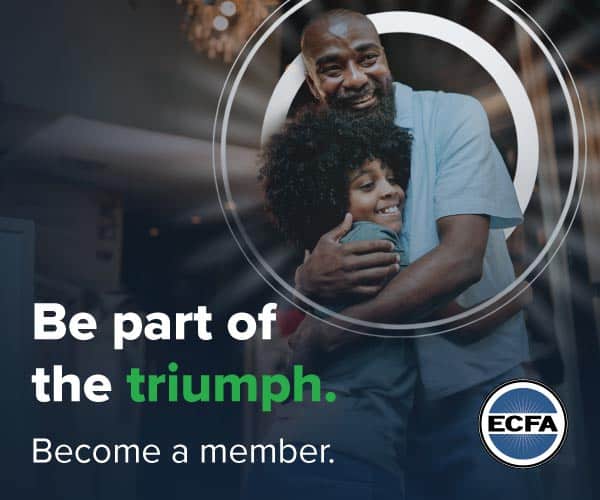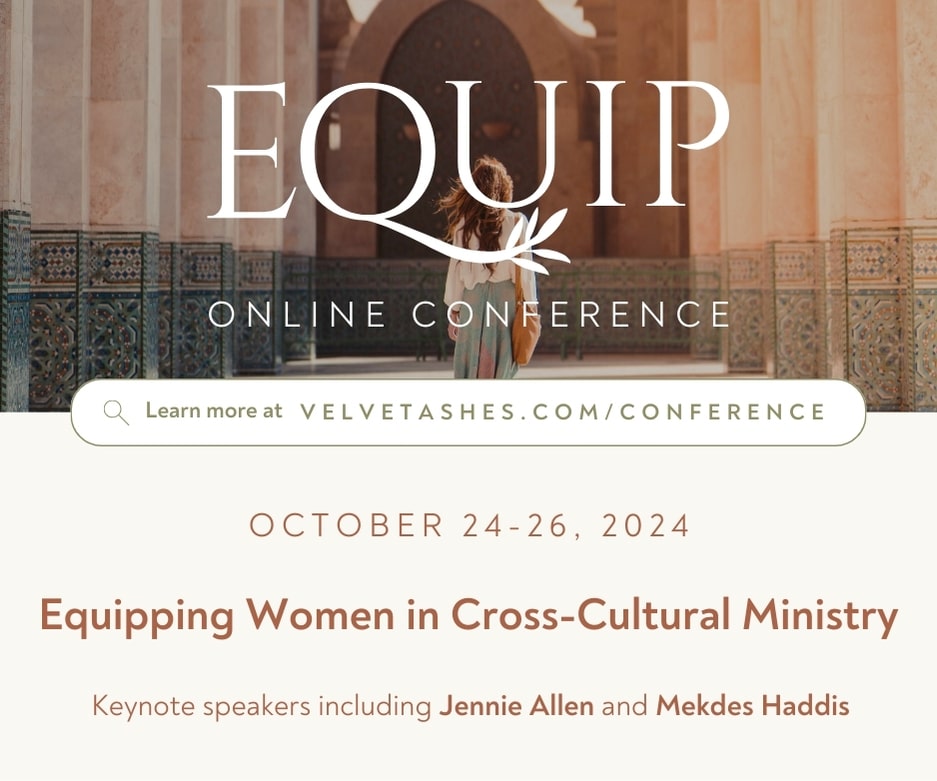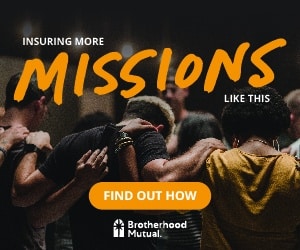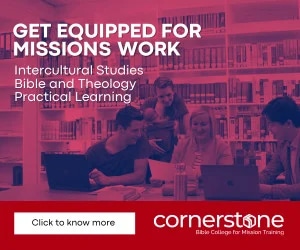EMQ » July–September 2023 » Volume 59 Issue 4

Summary: Medical missions, especially among least reached communities, seems difficult and the financial proposition absurd. Yet all people need healthcare. Healthcare missions is an open door to ministry which Jesus himself demonstrated as he met the physical and spiritual needs of people he ministered to. More missions organizations need to explore this opportunity alongside their other strategies.
By Joshua Bogunjoko
About 75 miles (120 km) south of Dubai, United Arab Emirates, local patients enter the lobby of a modern city hospital in the city of Al Ain and can’t miss a large sign which reads, “Come unto me all who are weary and heavy laden, and I will give you rest.” The hospital’s website advocates for Christ-centered compassion, and lists the hospital’s motto as “Healthy Communities Transformed by the Love of God” and core values which include “Christlikeness.”
Long known as Oasis Hospital, the facility’s name changed in 2022 at the direction of the Crown Prince of Abu Dhabi. It is now Kanad Hospital, honoring the name of its missionary doctor founders, Pat and Marian Kennedy. In 1960, then Sheikh Zayed bin Sultan Al Nahyan invited the missionary couple to come and set up a healthcare facility for infants and mothers. What gave him this thought? He and his brother had experienced Christian hospitals in neighboring Oman and Bahrain and wanted this same provision for their own country, where the infant mortality rate was 50% and the maternal mortality rate was 35%. It was the first hospital established in the Abu Dhabi Emirate.[i]
Today, Kanad Hospital is a state-of-the-art facility employing 600 employees, including more than 80 doctors. It is the largest Christian hospital in the entire Middle East. Its reputation for high-quality care means it is the birthplace of many national leaders, including the current Crown Prince of Abu Dhabi, as well as 130,000 babies since 1960. The modern facility was not built through missions fundraising campaigns. In 2006, His Highness General Sheikh Mohammed bin Zayed Al Nahyan gave the gift of a government development grant, enabling the construction of the new building.
In partnership with the local community and nation, the love of Christ and peace of the gospel is lived out publicly in word and deed. And this is happening among our Muslim friends and neighbors in the southeast of the Middle East!
The Open Door
While the circumstances behind the founding and continued existence of Kanad Hospital are unique, healthcare is an open door to communities where Christ is not known. Healthcare is universally understood and appreciated. It creates good rapport with local communities and with governments. Whether a people are rich or poor, sickness finds both. Some people need literacy programs; some need clean water projects; but all people need healthcare. Yet many missions organizations are not exploring this opportunity alongside their other strategies.
Jesus himself demonstrated the nature of the kingdom of God when he saw human suffering around him. He was moved to compassion and responded to alleviate physical pain. He did not ask people if they would like to become his disciples first. The woman with the hemorrhage who touched the hem of Jesus’ cloak had no personal relationship with Jesus until after her healing. In John 9, Jesus healed a man born blind, and the man did not even know who had healed him. He famously testified to the pharisees the one thing he knew for sure: “I was blind and now I see!” (v. 25) Later, Jesus introduced himself to the man. That healing opened the door to many conversations, and it led into Jesus’ well-known teaching about the Good Shepherd.
Although the main thing for medicine is the physical, emotional, and psychological health of individuals and communities, the main thing for healthcare mission must transcend these ideals. It’s main thing must be the restoration of human beings to wholeness in their relationship with the living God (a vertical relationship) and with those around them (a horizontal relationship) and with themselves, their community, and their environment (a circular relationship). It is nothing less than to restore people to dignity and shalom, the fullness of which is only possible in Christ.
If medical missions is to fulfill such a multi-dimensional mandate, then it must not be carried out in isolation or in casual relationship to other ministries. While the Western worldview often separates the physical and the spiritual as discreet realities, most Majority World cultures view these two dimensions as overlapping and influencing each other – actions in one directly affect the other. In other words, healthcare ministry can and must be fully integrated with evangelism, church-planting, and disciple-making, such that true shalom results. In the Andean mountains of Peru, such integration is taking place.
Going Mobile in the Mountains
Dina, a dental assistant who is also an evangelist, began periodically hiking to the remote village of Chacoche in the Peruvian highlands to tell Bible stories. The people of Chacoche are East Apurímac Quechua, and they speak a distinct dialect. While the government labels them Catholic, most hold to the traditional Andean religion of a sun god and mother earth who rule over creation. Daily life, including one’s health, is believed to be ruled by the weather and by the will of deities in the surrounding hills, who are greatly feared.
Peruvian Jesus-followers from a nearby village joined Dina in her visits and in time, they were hosting weekly church services for new believers. Then, with plans for a church building on the horizon, Dina and the other evangelists who had poured into this village invited the mobile healthcare ministry, Hope Dental Clinic, to come to Chacoche. Missionary Erin Connally, the dentist who started the ministry, says, “The believers wanted their neighbors to understand that they shouldn’t feel threatened by Christians, but that they were there to serve.”
Hope Dental Clinic serves both as an entrance into new communities and as longer-term support. The villages of East Apurimac are extremely poor and typically have small and struggling churches that are seeking opportunities to share the gospel with neighbors. Hosting a mobile clinic brings people to the church who would have never stepped foot inside. But this is not all.
Hope Dental Clinic integrates dental care with regular Bible teaching and evangelism outreaches through Peruvian evangelists. Erin’s husband, Brendan, leads the oral Bible storying side of the ministry, which works to pair the audio Bible with pictures and instruction for communities where literacy levels are low.
Many of the dental workers double as oral Bible storying volunteers. Resources such as picture books and solar-powered audio devices are helping to further the kingdom of God. The dental clinics are a time to host literacy classes, pastor trainings and scripture use classes, and form relationships with village leaders. In the evenings, evangelistic services mean that many patients hear the gospel for the first time.
The mobile dental team provides charitable services, but they rely on the village to pay for fuel, meals, housing, and a workspace. Patients pay $1 for an appointment. Clinics last for one to two days and return several times a year for up to three years. This holistic care approach helps them connect with the communities and support church plants beyond a one-time visit.
All of this takes place under the Christian organization AIDIA (Interdenominational Association for the Holistic Development of Apurímac), whose vision is to see churches planted and believers discipled into mature Christians in the rural villages of Apurímac, following the example of Jesus who treated the body and soul. Integrated ministries like this invigorate whole communities and usher in spaces for shalom.
This model is effective and seems to be straightforward, yet why are such methods not adopted more often?
Challenges to Doing Healthcare Ministry
In the early days of modern missions, missionaries, trained or not, provided basic healthcare wherever they went and established dispensaries. The author of By Prayer to the Nations writes, “SIM’s ministry to human need over the first half of the twentieth century grew side by side with evangelism and church planting. Almost every SIM mission station had a dispensary, well over 150 dispensaries on the field.”[ii]
Today this is no longer common, and although mission contexts have changed dramatically, I believe this is not because those contexts no longer need healthcare ministry nor because such contexts present insurmountable obstacles to these ministries. Rather, the reasons have more to do with missionary sending organizations.
First, it can be difficult to recruit medical staff. The national requirements vary from country to country and this, combined with time spent outside of one’s home country, means risking the loss or expiration of one’s medical registration. In addition, medical professions are lucrative and stable careers, which may take a person years to establish. Nevertheless, I believe there are many young people who would be zealous to adjust their career path to see the vision of medical missions come to pass, as we see it in the following example.
A few years ago, SIM was exploring ministry in Madagascar. Our team visited a hospital there which, we soon learned, had planted 27 churches. The hospital also had an FM radio transmitter for the expressed purpose of evangelism and health training. The ministry had begun as a church planting outreach linked to some basic health services, but it grew into a functional hospital with surgery, radiography, laboratory, and inpatient services.
One person on the team reported, “The hospital is an outstanding example of a church-based institution. From the moment of arrival and meeting the 28 church leaders from the surrounding church-plants, it was evident that the common denominator through out every facet of the hospital – from community health, to daily evangelistic out-patient preaching, to nurses training, to community radio services, to local primary school – was evangelism and church planting.”
Second, there is the assumption that medical ministry involves a hospital, and running institutions is expensive. Similarly, there may be a belief that the profession of medicine is highly technical and sophisticated. However, these assumptions overlook the countless opportunities for healthcare ministry, both preventative and curative, that are community-based. The Evangelical Church of Liberia (ECOL) denomination is sending teams to Muslim villages. The teams consist of evangelist and healthcare volunteers. The integration of evangelism and healthcare is a low cost yet highly tangible and effective approach.
In Ethiopia, staff at a remote mission clinic travel to follow-up with patients who have come in for treatment. This is an opportunity to meet community members in their homes, get to know them personally, and share stories of the Bible. In one instance, the missionaries followed up on a little girl who had been to the clinic. They shared the Bible using oral storying methods, and the neighbors gathered to listen. After several visits, the missionaries explained that the child was fully healed, and there was no need to return for medical reasons. The community insisted they return and share more stories because they were now friends. Several families turned to Christ, and a church was born in this location.
Third, many organizations, when they think of unreached groups and contexts, simply do not think of healthcare as a gateway. Yet, communities where Christ is least known are often the communities where physical suffering is the most acute. Decades ago, missionaries were barred from entering Nigeria’s Muslim north. It was the offer of hospitals for people with leprosy that opened the doors. For missions, healthcare strategy should bea church-planting strategy, and healthcare professionals can open doors even in some of the most resistant communities.
An initiative of SIM and its partners, called Faithful Witness,[iii] places teams of multi-cultural, multi-skilled workers in communities where there is no church and virtually no Christian witness. Several years ago, we surveyed communities among the Moor of Mali. Only one known believer was identified among these Hassaniya-speaking Moors.
Our team made visits to a cluster of remote villagers, introducing themselves as followers of Jesus who desired to come and live among them, learn their language and culture, and bless their communities. The village leaders welcomed our team on several occasions, and then identified three areas of need: healthcare, water, and education for their children. Among 20 large villages, there was not a single clinic. Today, we have a team living as neighbors among them.
A fourth challenge is that medical services, once a mainstay of missions, is now perceived as the responsibility of national governments. So, missions have tended to move away from it. But millions are living beyond the reach of government healthcare facilities. And where government facilities are present, they may welcome the invigorating contributions of mission professionals whether for training or direct care, as we can see in Kanad Hospital in the UAE.
In a country where the majority of people follow a different religion, one organization is mobilizing the local church and to recruit and equip local Christian doctors. These professionals will go to work in former mission hospitals that once dotted the nation but are now government hospitals that have closed or are not functioning well. This will invigorate the nation’s healthcare infrastructure and rekindle the light of the gospel in communities where the light had gone out.
Finally, I would like to mention the risk of burnout among medical workers in instances where support and care is missing or where there has not been appropriate equipping. The scale of medical needs, long working hours, scarce resources, harsh climates, and staff shortages can erode the capacity of workers to thrive and can undermine their longevity on a field.
While mentoring, counselling, and other supports are more available today than ever before, safety and security are significant issues in places that need medical missionaries most urgently. In addition, many medical workers feel they have not been fully equipped for medical and spiritual care as an integral ministry.
Thanks to the work of CMDA (pathlms.com/cmda) and Saline Training (ihsglobal.org/SalineProcess), more resources for preparing healthcare workers exist today than ever before. Mission agencies must be prepared to prevent and respond to the stresses of healthcare workers, ensuring that they are adequately equipped, for the sake of both the lost and the called.
Embracing Abundance
In John 6 (v. 5), Jesus saw the needs of the crowd and asked this question: “Where shall we buy bread for these people to eat?” In Matthew’s account, the disciples wanted to send the crowd away. But Jesus had compassion and said, “They do not need to go away. You give them something to eat” (Matthew 14:16, emphasis added).
One incredulous disciple explained the financial absurdity – it would take over a half year’s wages to buy enough food for everyone to have a bite. Another disciple brought a boy to Jesus with five loaves and two fish and said, “But what is this among so many?” Perhaps he hoped the boy’s lunch would at least curb the hunger pangs of the disciples. But Jesus “took the loaves, and when he had given thanks, he distributed them.” More than 5,000 people were filled, leaving baskets of leftovers.
Many of us share the mentality of the first disciple. Medical missions, especially among least reached communities, seems difficult and the financial proposition absurd. Others consider non-financial resources and arrive at the same conclusion. Perhaps we feel it is reasonable to help ourselves, at least. After all, we need healthcare, too. But who has Jesus’ mentality of abundance?
In our post-pandemic era, when fear and uncertainty are the new normal for many, do we see the crowd as the disciples did or as Jesus did? Is our focus on the uncertainties in our individual lives or on the peril of millions?
Healthcare is desired almost everywhere. If the door appears closed, I assure you, it is not locked. One gentle push, by prayer and in wisdom, will open it. Jesus himself demonstrated the nature of the kingdom as he met physical and spiritual needs side by side. Would we explain to him, as the disciples did, how this is financially and logistically impossible?
Let us take inventory of our resources, however small they may seem, and submit these to Jesus. Then let us prepare ourselves to carry full baskets to a hungry world by making healthcare ministry a priority among those who live and die without hearing or understanding the Good News.

Joshua Bogunjoko, MD (international.directorea@sim.org), brings three decades of leadership and mission experience to his role as leader of SIM. He is also a family physician with experience in surgery and holds a master’s in leadership and management. Within SIM, he has served as chief medical officer and director of Galmi Hospital, Niger and as deputy international director for Europe and West Africa. Since 2013, he has served as the international director.
[i] “Kanad Hospital: The story of the Al Ain hospital where Sheikh Mohamed was born,” Gulf News, accessed June 1, 2023, https://gulfnews.com/uae/year-of-the-50th/kanad-hospital-the-story-of-the-al-ain-hospital-where-sheikh-mohamed-was-born-1.79714052; “Our History,” Kanad Hospital, accessed June 1, 2023, https://kanadhospital.org/our-history/.
[ii] Gary Corwin, By Prayer to the Nations: A Short History of SIM (Oklahoma City: Credo House Publishers, 2018), 277.
[iii] “Faithful Witness,” SIM, accessed June 1, 2023, https://www.sim.org/faithfulwitness.
EMQ, Volume 59, Issue 4. Copyright © 2023 by Missio Nexus. All rights reserved. Not to be reproduced or copied in any form without written permission from Missio Nexus. Email: EMQ@MissioNexus.org.






Responses